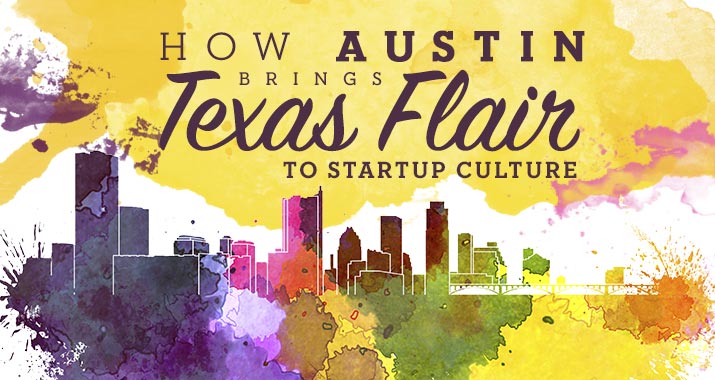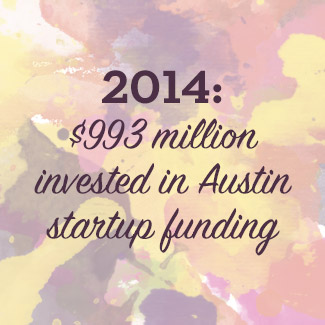Bigger, Better, Bolder: How Austin Brings Texas Flair to Startup Culture

The buzz about the startup culture in Austin is making it one of America’s fastest growing cities. From 2010 to 2015 its population grew significantly, a total of 8.2 percent according to census estimates.
The city’s tech startup scene is certainly one of the major reasons for the growth, as aspiring entrepreneurs choose Austin as the location for launching their startup. Why is Austin so enticing? And what are the drivers behind its growth?
How Austin Became a Startup Capital
To understand why Austin continues to draw well-funded startups, it’s best to go back to the beginning. What made Austin the city it is now? A variety of events, companies and other factors transformed Austin from the state capital of Texas into one of the hottest tech destinations in the country.
A Brief History of Austin Startups
Austin quickly developed a presence in the technology industry when big-name corporations like IBM, Dell and AMD all chose to come to Austin in the 1980s. These moves set Austin on a course to become the tech hub it is today. The three companies brought the money and talent necessary to begin planting the seeds of a premier startup scene.
The modern tipping point came in the 1990s with the arrival of Trilogy Software, the first massive software company to land in Austin. Trilogy brought the software and Web development products that helped give the startup scene a shot in the arm. In less than a decade, startups like HomeAway and Bazaarvoice blazed the trail for what a successful Austin startup could be.
Notable Austin Startups
A variety of highly successful companies began as startups in the Austin metro area. Many people refer to Austin and San Antonio as the “Silicon Hills” because the startup
community is impacting the global technology world. Each of the following three startups gives hope to the many entrepreneurs who come to Austin.
Indeed
Billed as a “one search, all jobs,” Indeed allows job hunters to use one search to access numerous databases. The company was founded in Austin in 2004 and gradually gained popularity. As more and more people used job sites, Indeed became the primary way to search the rest of the sites. Indeed surpassed Monster in 2010 to become the most popular job site in the country. In 2012, Indeed was purchased for $1 billion by Japanese HR company Recruit Co.
Indeed continues to enjoy success. For the first half of 2015, the company reported a 57 percent year-over-year revenue increase, while 2016 brought its services — formally exclusive Austin— to 8 new countries. The company’s service area now includes a total of 60 nations, with more than 2,400 direct employees on their staff. Their headquarters remain in their city of origin.
HomeAway
Listing more than 1 million vacation rentals in 190 countries, HomeAway offers people a comprehensive selection of houses, condos and cabins across the globe. The site launched in 2006 after the merger of several companies, and HomeAway later located in Austin. HomeAway went public in 2011 and was valued at $2.9 billion. The company remains a fixture in the Austin tech scene and boasted $446.8 million in revenue in 2014. As a testament to its profitability, Expedia acquired the site for $3.9 billion in 2015. HomeAway remains a fixture in the Austin tech scene.
Gowalla
Launched in 2007 by four Austin residents, Gowalla was a location-based social network that gained considerable market share in the once-booming world of social media. The concept grew popular quickly, especially after garnering several awards at 2010’s South by Southwest Conference (SXSW). Nevertheless, Gowalla was acquired by Facebook for an undisclosed sum and shut down in 2012.
What Makes Austin So Attractive to Startups?
The Silicon Hills have a long track record of being a smart place to begin a startup, but what is it about the community and startup culture that contributes to its success?
Investors and Accelerators
Money is the most important consideration for any new business. So it should be no surprise that one of Austin’s biggest strengths is the wealth of capital available for potential startups. The 2014 Austin Startup Report lists the amount of funding invested in Austin startups as $993 million, a 123 percent increase from the previous year. These funds are coming from a wide variety of angel investors and venture capitalists, most of whom are constantly on the search for possible additions to their portfolios. Austin includes several investor groups based in the city, with several others that have satellite offices in the metro area.
Startups are able to more easily catch the eyes of investors due to the number of accelerators and incubators in the city. These organizations focus on providing startups with access to tools, expertise and, of course, money that can help them reach their goals. Some of the most influential accelerators and incubators in the country are based in Austin, with many other investors interested in what the next entrepreneurs are working on.
South by Southwest
Begun in the 1980s as a music festival in Austin, SXSW has since evolved into one of the most important interactive festivals worldwide. SXSW Interactive brings tech moguls and minds to Austin to talk about emerging technologies and growth in the industry. The event always has a special focus on startups. As a result, several companies like Twitter, Foursquare and GroupMe began their journeys to popularity there. SXSW is now the crown jewel of the Austin startup scene — a week where all eyes are on Austin.
Cost of Living
If it’s cheap to live somewhere, then talented people will be far more likely to move there. The cost of living index for 2015 shows Austin to be more affordable than most major metropolitan cities, including other tech hotspots like San Francisco, New York City, and Los Angeles. Suburbs of the city are consistently listed by Kiplinger as among the cheapest places to live in America, and Austin is regularly among the highest rated by young professionals.
Higher Education
Even though Austin attracts an influx of talent from other cities and states, the city maintains a strong local talent pipeline. The University of Texas at Austin is ranked as a top 10 school in computer science, computer engineering and business by U.S. News and World Report. Likewise, graduates of Concordia University Texas possess the knowledge and skills needed to thrive in Austin’s economy. Many Austin startups have been founded by the alumni of local schools, and the presence of institutions of higher learning is recognized throughout the community.
Where to Start?
The Silicon Hills may never be as prominent as Silicon Valley, but the area should continue to play a leading role in the future of startups. Concordia University Texas offers an online B.A. in Business, an online MBA and an online B.A. in Computer Science for students seeking a quality education that leads to a successful career in the startup world. Discover the possibilities at Concordia University Texas today.
